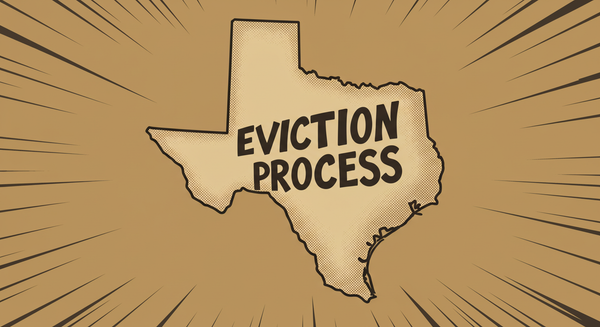New Jersey Squatters Rights Guide: Understanding Adverse Possession Laws
Required occupation period: 30 years for most properties in New Jersey; 60 years for woodlands and uncultivated tracts of land.

From the Newark SWAT team standoff with a sovereign citizen squatter, to the heartbreaking story of the Canfield family who became "squatters in their own home" after a foreclosure scam, to the organized criminal ring in Mercer County that systematically targeted vacant properties, New Jersey has witnessed some of the nation's most dramatic and concerning squatter incidents.
Understanding the state's uniquely stringent adverse possession laws—with their 30-year statutory period and tax payment requirements—is essential for property owners seeking to protect their real estate investments in the Garden State.
Trespassing vs Squatting
In New Jersey, there's a critical legal distinction between squatters and trespassers:
Trespassers are individuals who unlawfully enter property without permission for brief periods and can be removed immediately by law enforcement.
Squatters occupy property without permission for extended periods with the intention of establishing residency, potentially leading to adverse possession claims after the 30-year statutory period
Squatter Snippet: Real Case from New Jersey
In 2021, a Newark homeowner returned to find her property had been taken over by a member of the sovereign citizen movement. The situation escalated to such an extreme that local authorities were forced to deploy a SWAT team to remove the squatter from the premises. The sovereign citizen had changed locks and claimed immunity from New Jersey law, making traditional eviction processes nearly impossible.
This case exemplifies the dangerous intersection between extremist ideologies and property rights violations, demonstrating why understanding New Jersey's squatter laws is essential for property owners.
The Basics of Squatters Rights in New Jersey
- Adverse possession(aka, squatters rights) in New Jersey is governed by specific statutes (N.J.S.A. 2A:14-30 and N.J.S.A. 2A:14-31)
- Historically, adverse possession laws in New Jersey were designed to ensure productive land use and resolve boundary disputes
Key Timeline: Statutory Period in New Jersey
- Required occupation period: 30 years for most properties in New Jersey
- Special case - woodlands/uncultivated tracts: 60 years continuous possession required
- Comparison with neighboring states:
- New York: 10 years
- Pennsylvania: 21 years
- Timeline exceptions:
- Military service may pause the statutory period
- Legal incompetence/disability may affect timeline calculations
CHART: Adverse Possession Timeline Comparison
| State | Required Years | Special Conditions |
|---|---|---|
| New Jersey | 30 years (general) | 60 years for woodlands; tax payment required |
| New York | 10 years | Color of title may reduce to 10 years |
| Pennsylvania | 21 years | No tax payment requirement |
| Delaware | 20 years | Must pay property taxes |
Quick Guide for Property Owners
New Jersey has some of the most stringent adverse possession requirements in the United States, with statutory periods among the longest nationwide. In 2018, Mercer County prosecutors uncovered a sophisticated squatting operation where 12 individuals systematically targeted vacant and foreclosed homes, changing locks, illegally activating utilities, and creating fake lease agreements.
Hamilton Township alone reported 50 squatter incidents over 14 months. This organized criminal exploitation of squatters' rights demonstrates why understanding New Jersey's specific legal requirements is critical for property owners.
- Know your timeline: Squatters can only claim rights after 30 years of continuous occupation (60 for woodlands)
- Documentation matters: Maintain property records, tax receipts, and regular inspection logs
- Regular monitoring required: Vacant properties are particularly vulnerable to squatting
- Legal obligation: Self-help eviction methods are illegal in New Jersey
- Act quickly: The longer squatters remain, the stronger their potential claim becomes
- Proper notices: Follow New Jersey's specific legal procedures when removing unauthorized occupants
Prevention: Protecting Your Property
In New Jersey, squatters typically target vacant homes, especially those in foreclosure or undergoing sale. Court data shows that properties left unmonitored for more than 30 days face substantially higher risks. New Jersey courts view evidence of regular property monitoring highly favorably when evaluating adverse possession claims.
In recent legal decisions, property owners who could demonstrate consistent inspection schedules were significantly more successful in defeating adverse possession attempts.
- Regular inspections:
- Visit property at least monthly
- Document each visit with dated photos/notes
- Effective security measures:
- Secure all entry points with quality locks
- Consider alarm systems with remote monitoring
- Install motion-activated lighting and cameras
- Clear signage:
- Post "No Trespassing" signs visibly around the property
- Mark property boundaries clearly to prevent encroachment
- Property management options:
- Hire professional management for vacant properties
- Consider short-term rental options for long-term vacancies
- Documentation practices:
- Keep tax payment records (critical for defeating adverse possession claims)
- Maintain utility connections or monitor disconnected utilities
- Take dated photographs regularly of property condition
CHART: Property Risk Assessment Matrix
| Property Type | Risk Level | Recommended Prevention | Estimated Cost |
|---|---|---|---|
| Vacant Land | High | Regular inspections, clear boundary markers, "No Trespassing" signs | $500-$2,000 |
| Abandoned Building | Very High | Security system, reinforced doors/windows, property management | $2,000-$5,000 |
| Seasonal Property | Medium | Smart home monitoring, neighbor check-ins, security system | $1,000-$3,000 |
| Investment Property | Medium | Professional property management, tenant screening, regular inspections | $1,500-$4,000 |
Removing Squatters: Step-by-Step Eviction Process
New Jersey law treats squatting primarily as a civil matter under N.J.S.A. 2A:18-53 and N.J.S.A. 2A:18-61.1, which govern eviction procedures. Unlike some states, New Jersey doesn't have specific "anti-squatting" criminal statutes, though trespassing laws (N.J.S.A. 2C:18-3) may apply in certain circumstances.
Recent proposed legislation (Senate Bill S725) aims to criminalize squatting as "housebreaking" or "unlawful occupancy," but current property owners must generally follow civil eviction procedures. New Jersey courts impose substantial penalties for illegal self-help evictions, including potential triple damages and attorney fees.
- Document the situation:
- Take dated photos/video of the occupation
- Gather property deeds, tax records, and ownership documents
- Issue proper written notice to vacate
- For trespassers/squatters: 3-day notice
- Document delivery of notice
- File appropriate legal complaint:
- File an Order to Show Cause with Temporary Restraints in Superior Court
- Include all required ownership documentation and evidence
- Attend court hearing
- Present evidence of ownership and unauthorized occupation
- If successful, obtain order of restitution/eviction
- Court will grant judgment for possession
- Sheriff enforces removal, not property owner
- Only sheriff's officers can physically remove squatters
- What NOT to do:
- Do not change locks yourself while squatters occupy the property
- Do not shut off utilities to force squatters out
- Do not remove squatter's belongings without court order
- Do not threaten or intimidate squatters
- Do not use physical force to remove occupants
- Timeline expectations:
- Notice period: 3 days minimum
- Court processing: 2-4 weeks
- Eviction enforcement: 1-3 weeks after judgment
CHART: Eviction Process Timeline
New Jersey's eviction process is governed by N.J.S.A. 2A:18-53 through 2A:18-84, which establish strict procedural requirements. The New Jersey Administrative Office of the Courts reports that squatter evictions typically take 4-6 weeks from filing to enforcement.
Accelerated proceedings are available in limited circumstances under N.J.S.A. 2A:18-53(c) for cases involving property damage or immediate safety concerns.
Recent court data from the New Jersey Judiciary shows average processing times of 22 days from filing to judgment in uncontested cases.
[Discovery of Squatter] → [Documentation: 1-2 days] → [Notice to Vacate: 3 days] →
[Court Filing: 1 day] → [Waiting for Hearing: 2-3 weeks] → [Court Hearing: 1 day] →
[If successful, Wait for Order: 3-5 days] → [Sheriff Enforcement: 7-14 days] → [Property Returned]
Total estimated timeline: 4-8 weeks
Legal Requirements for Adverse Possession
New Jersey courts apply the "OCEAN" criteria (Open, Continuous, Exclusive, Adverse, Notorious) stringently when evaluating adverse possession claims.
In the landmark case of Patton v. North Jersey District Water Supply Commission (1983), the New Jersey Superior Court established that adverse possession claims require "visible acts sufficient to put an ordinarily prudent person on notice of occupation."
The burden of proof in New Jersey adverse possession cases falls heavily on the claimant, who must provide "clear and convincing evidence" of all required elements—a higher standard than the "preponderance of evidence" used in most civil matters.
- Hostile Claim
- Occupation must be without the legal owner's permission
- New Jersey follows the "objective" standard of hostility
- Case example: Predham v. Holfester (2009) established mere mistaken boundary encroachment insufficient
- Actual Possession
- Physical occupation required
- Courts look for improvements, maintenance, utilities in claimant's name
- Merely storing items occasionally is insufficient
- Open and Notorious Possession
- Use must be visible to community and property owner
- Must be obvious enough that a reasonable owner would notice
- Recent case: Min Wu v. Peter Gesualdo (2020) rejected claim due to insufficient visibility
- Exclusive Possession
- Squatter must possess property exclusively, not shared with true owner
- Must act as true owner would in maintaining boundaries
- Evidence: exclusive maintenance, preventing others' access
- Continuous Possession
- 30 years for most properties; 60 years for woodlands
- Seasonal use may qualify if consistent with property type
- "Tacking" (combining possession periods) allowed with privity
CHART: Adverse Possession Requirements Matrix
| Requirement | Required in New Jersey? | Evidence Courts Accept | Common Pitfalls |
|---|---|---|---|
| Hostile Claim | Yes | Improvements without permission, non-permissive use | Having any form of permission, lease, or agreement |
| Actual Possession | Yes | Residence, maintenance, utility payments | Occasional or sporadic use only |
| Open & Notorious | Yes | Visible improvements, neighbors' testimony | Hidden or concealed occupation |
| Exclusive | Yes | Fencing, no sharing with true owner | Allowing others access, including true owner |
| Continuous | Yes | 30 years (60 for woodlands) documented timeline | Significant gaps in occupation |
Frequently Asked Questions
- "Can I remove squatters myself in New Jersey?"
- No, self-help eviction is illegal in New Jersey
- Must follow proper legal eviction process through courts
- "Do squatters have to pay property taxes in New Jersey?"
- Yes, New Jersey requires tax payment for at least five consecutive years
- Tax payment records strengthen adverse possession claims
- "What's the difference between a squatter and a trespasser in New Jersey?"
- Trespassers: Short-term unauthorized presence (criminal offense)
- Squatters: Long-term occupation with potential adverse possession claim (civil matter)
- "Who should I contact first - police or sheriff?"
- For immediate safety concerns or recent entry (24-48 hours): Police
- For established squatting situations: File court action, sheriff enforces
- "Can squatters claim abandoned property in New Jersey?"
- Yes, if meeting all adverse possession requirements for 30-60 years
- Abandonment may strengthen their claim under certain circumstances
- "How quickly can I evict a squatter in New Jersey?"
- Typical timeline: 4-8 weeks minimum
- Factors affecting timeline: court backlog, evidence quality, squatter defense
CHART: Decision Tree for Property Owners
New Jersey law enforcement agencies distinguish between criminal trespass (N.J.S.A. 2C:18-3) and civil squatting situations based on the duration and nature of the unauthorized occupation.
According to guidelines published by the New Jersey Attorney General's Office, police will typically intervene directly in cases of recent entry (less than 48 hours) or when criminal activity is evident. For established occupations, property owners must pursue civil remedies through the Superior Court or Special Civil Part.
Discovered Someone on Your Property
├── Emergency/Dangerous Situation? → Yes → Call Police
│ └── No ↓
├── Recent Entry (Less than 48 hours)? → Yes → Call Police (Trespasser)
│ └── No ↓
├── Evidence of Established Occupation? → Yes → Legal Eviction Process Required
│ └── No ↓
└── Uncertain Situation → Consult Attorney Before Taking Action
Recent Legislative Changes in New Jersey
New Jersey lawmakers have recently proposed significant legislation to address squatting concerns and modernize adverse possession laws. Assembly Bill A2674 (2024) aims to clarify timeframes for establishing adverse possession claims and address disputes arising from natural disasters like Hurricane Sandy. More notably, Senate Bill S725 (2024) proposes criminalizing squatting as "housebreaking" or "unlawful occupancy," which would substantially alter enforcement options. This shift reflects growing recognition of organized squatting operations, such as the 2018 Mercer County case where 12 individuals systematically targeted vacant homes with fake lease agreements.
- Recently Passed Laws:
- Assembly Bill A653 (2023): Strengthened requirements for establishing "open and notorious" possession
- Impact on property owners: Higher burden of proof for adverse possession claimants
- Effective date: January 1, 2024
- Pending Legislation:
- Senate Bill S725: Would criminalize squatting as "unlawful occupancy"
- Proposed changes: Allow faster police intervention without civil proceedings
- Expected vote: Summer 2025
- Legislative Trends:
- Increasing protections for legal property owners
- Shortening timeline for removing unauthorized occupants
- Comparison to national trends: Aligning with stronger anti-squatting measures
State-Specific Considerations
- Color of Title in New Jersey:
- Definition: Defective or invalid document appearing to grant title
- Impact on statutory period: Must be present throughout 30/60-year period
- Documentation requirements: Must appear valid on its face
- Burden of proof requirements:
- "Clear and convincing evidence" standard
- Higher than typical civil "preponderance" standard
- Squatter bears burden for all elements
- Recent legal developments:
- Min Wu v. Peter Gesualdo (2020): Strengthened "open and notorious" requirement
- Pending legislation to criminalize squatting
- How New Jersey differs from neighboring states:
- Longest statutory period in region (30/60 years vs. 10-21 elsewhere)
- Tax payment requirement (absent in Pennsylvania)
- Stricter judicial interpretation of adverse possession elements
CHART: New Jersey vs. Neighboring States Comparison
| Factor | New Jersey | New York | Pennsylvania | Delaware |
|---|---|---|---|---|
| Statutory Period | 30/60 years | 10 years | 21 years | 20 years |
| Color of Title Impact | Required | Reduces to 10 years | No reduction | No reduction |
| Tax Payment Required | Yes | Yes | No | Yes |
| Special Conditions | 60 years for woodlands | Reduced with documented title | None | None |
| Strictness Rating | 5/5 | 3/5 | 4/5 | 3/5 |
Advanced Legal Process
- Court proceedings typically occur in New Jersey Superior Court, Law Division
- Evidence must include tax payment records, testimony on continuous use, and documentation of hostile claim
- Potential outcomes include full property transfer, partial boundary adjustment, or complete rejection
- Monetary judgments may include compensation for improvements or damages
- Impact on property title: Successful adverse possession creates new legal title
- Special provisions exist for legally incompetent individuals and minors, often pausing the statutory period
Real-World Examples
- The Mercer County Squatter Scam (2018): 12 individuals systematically targeted vacant homes with fake lease agreements, demanding payouts to vacate
- Newark SWAT Team Case (2021): Sovereign citizen squatter claimed owner's home, requiring SWAT intervention
- The Canfield Family (2013): Family became "squatters in their own home" after falling victim to foreclosure rescue scam
- Min Wu v. Peter Gesualdo (2020): Failed adverse possession claim due to insufficient evidence of open and notorious use
Resources
- Current New Jersey Squatters Rights Laws:
- New Jersey Courts: Landlord/Tenant Information
- Last updated: January 2025
- Recent/Pending Legislation:
- New Jersey Legislature: Bill S725
- Bill status: In committee review
Legal Disclaimer
DISCLAIMER: The information provided in this guide is for general informational purposes only and should not be construed as legal advice on any subject matter. The content contained herein does not establish an attorney-client relationship.
This guide about New Jersey squatters' rights and adverse possession laws is intended to provide general information and should not be relied upon as legal advice. Laws and regulations regarding property rights, adverse possession, and eviction procedures vary by jurisdiction and may change over time. The information presented here may not reflect the most current legal developments or address your specific situation.
No reader should act or refrain from acting based on information in this guide without first seeking professional legal advice. Property owners dealing with squatters should consult with a qualified attorney licensed to practice in New Jersey for advice tailored to their particular circumstances.
The authors, publishers, and distributors of this guide expressly disclaim all liability in respect to actions taken or not taken based on any or all of the contents of this document. They shall not be responsible for any errors or omissions in this information or any consequences arising from its use.
This guide is provided "as is" without warranty of any kind, either express or implied, including but not limited to implied warranties of merchantability, fitness for a particular purpose, or non-infringement.
Copyright © 2025 LandlordDoc.com. All rights reserved.





